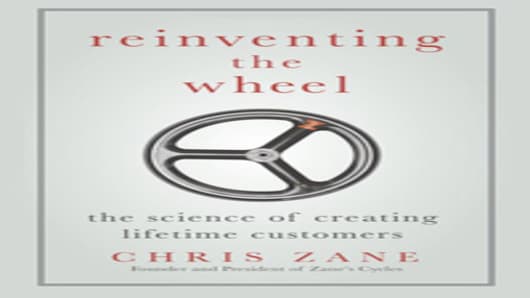Corporations are still customers; treat them that way by Chris Zane, Author of "Reinventing the Wheel: The Science of Creating Lifetime Customers."
Delivering value to your customer is the same whether your customer is standing in front of you at a cash register or if you are fulfilling a $1 million PO for Pepsi. Value comes from providing the decision maker what they need to continue to offer your company the opportunity to earn additional business.
Zane’s Cycles is one of the largest bicycles retailers in the nation, so it would be fair to wonder what I would know about satisfying the needs of Marriott, American Express, or MGM.
It turns out, however, that 75 percent of our revenue comes from business-to-business relationships, and we have averaged 24 percent growth annually for 30 years.
As the B2B portion of our business continues to grow, the single most important thing I’ve learned about delivering value to a B2B customer is to treat it just as you would a B2C customer: figure out what is important at any given moment, and exceed your customer’s expectations.
The only way to build an organizational culture that can consistently fulfill this promise is to consider the lifetime value of the relationship rather than the value of each single transaction.
Knowing the lifetime value of a customer makes it easy to justify the overnight shipping expenses caused when the incentive catalog company happens to misplace an order for one of their credit card point redemption recipients, needs a bike delivered the next day, and doesn’t have it in their budget to cover the overnight shipping; or when Anheuser-Busch runs a promotion that offers blue and silver bikes and the recipient now wants a black and yellow one after having ridden the original for a month. We can justify these expenses only because we focus on the lifetime value of the relationship; if we didn’t, none of these requests would be considered. In the relationship business, if you occasionally need to lose a little in order to win a lot, so be it.
Most of our day is spent making sure that what we are delivering is what we promised, but when a special request pops in, that’s the time to really shine and to show our customer why they made a great decision awarding us their business rather than one of our competitors.
To expand on our commitment to provide an extraordinary experience, we have a “whatever you want we’ll deliver” attitude. I want my customers to ask me for whatever they need, want, or even imagine, and I’ll fulfill their needs – happily and on their terms.
"If we always provide our customers with what is important to them, it becomes incredibly difficult for our competitors to get their contact information into our customers’ databases."
I know it sounds crazy, but it works, and here’s a great story that proves it.
A fellow executive and I recently had lunch. He was frustrated that a longtime customer had a competing bid for some printing that was below his cost. He seemed offended that the customer had shopped price since he had been providing exemplary work for years on all his previous jobs. Frustrated, he declined to meet the competing quote and, in a way, was trying to credibly justify his previous prices. I asked if he had he done multiple jobs for them at his quoted price and if the relationship was profitable; he answered “yes” to both questions. I then asked what his cost was to acquire a new customer, and could he guarantee the new customer would be as valuable? Finally, I asked whether he would consider losing money on a couple of transactions to build a relationship with a new customer.
The point I was trying to make is that sometimes we need to make concessions in order to provide the customer with what is important to them. That day, the buyer was focused on price. Next time, they might be focused on delivery time or quality of work. Obviously, those issues are in line with the standard operating procedure, so to us, they don’t feel quite as cash-flow draining as a concession on price. As we departed, he promised that he would repair the relationship and provide his customer with a top quality, on-time job, meeting the competitor’s price.
As my team and I manage our B2B customers and relationships, we keep one thought top of mind, which provides us with valuable competitive insulation, “If we always provide our customers with what is important to them, it becomes incredibly difficult for our competitors to get their contact information into our customers’ databases.” Simply, why would your customer add a new contact to their rolodex if you’ve always been the solution to their problems?
Building relationships with any customer, B2B or B2C, is based on trust and the equal exchange of value. Figure out how to build trust and value with your customer, and they will reward you with loyalty and opportunity.
Chris Zane is founder and owner of Zane’s Cycles in Branford, Connecticut and author of the new book Reinventing the Wheel: The Science of Creating Lifetime Customers (Ben Bella Books; March 2011)
Email me at bullishonbooks@cnbc.com — And follow me on Twitter @BullishonBooks


